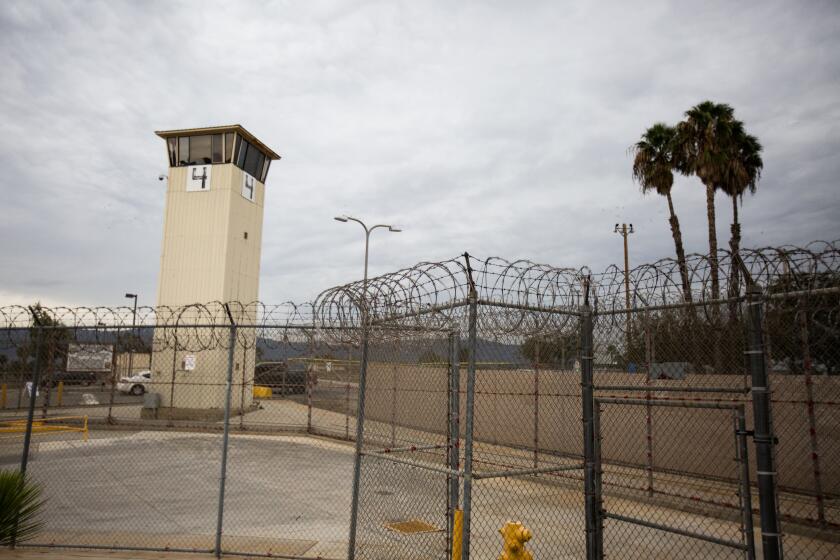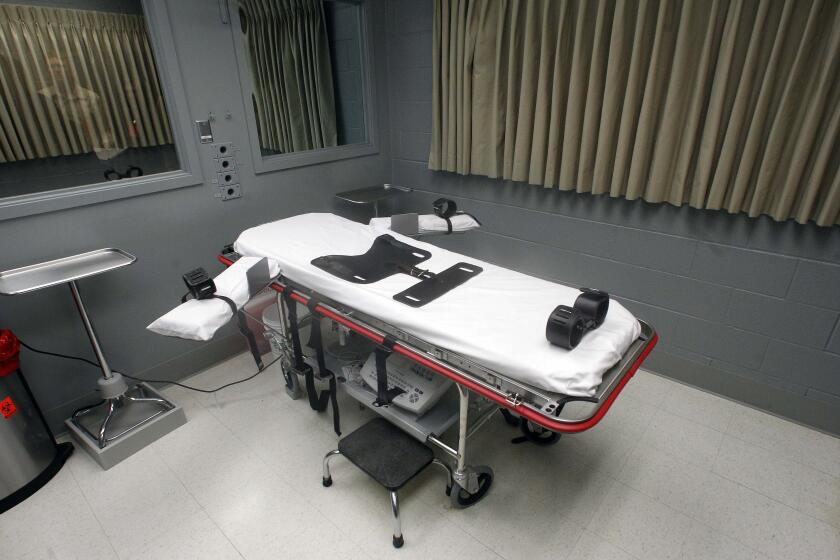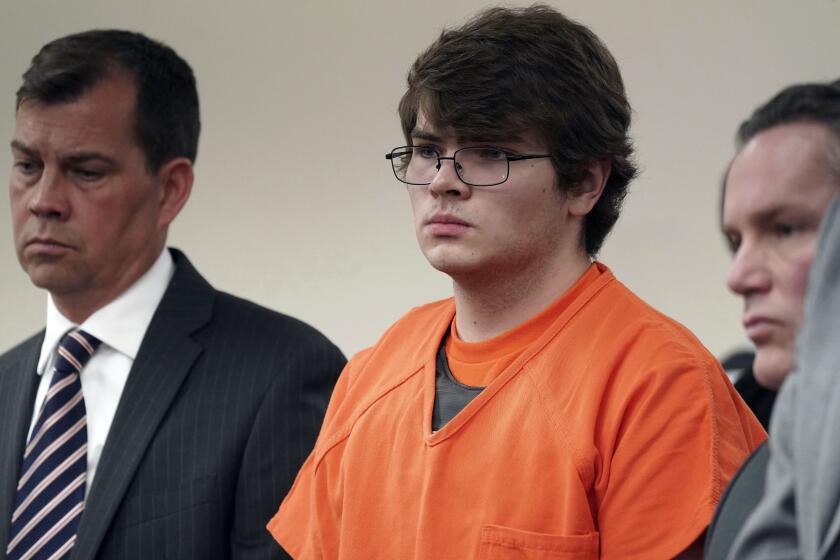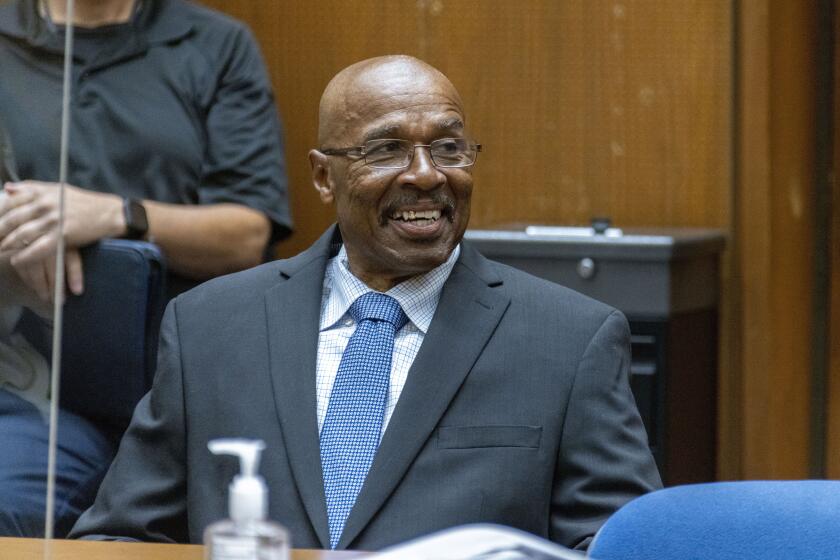Of course the death penalty is racist. And it would be wrong even if it weren’t

- Share via
Civil rights organizations and defense attorneys last month asked the California Supreme Court to invalidate the death penalty in this state for being irredeemably racist. Around the same time, Alameda County Dist. Atty. Pamela Price announced that a federal judge had ordered her to review 35 cases her office had handled over the last three decades after she discovered evidence that prosecutors systematically excluded Black and Jewish people from juries hearing capital cases.
As written, death penalty laws are race-neutral. Is the death penalty racist?
Racism continues to infect the criminal justice system, leading to disproportionate numbers of Black and Latino Americans in prison. California can continue a program to correct the problem if Gov. Gavin Newsom signs AB 256.
Of course it is. Evidence and experience show racial bias at play at every level of the criminal justice system, from arrest to jury selection to verdict. The disparities are particularly glaring in death sentences. Black defendants were 4.6 to 8.7 times more likely to be sentenced to death than other defendants facing similar charges, according to a landmark study of thousands of murder and manslaughter convictions dating to 1978. Latinos were 3.2 to 6.2 times more likely to be sentenced to death.
The disparity is even larger when the defendant was Black or Latino and the victim was white or Asian.
Lawmakers could improve the justice system by increasing police transparency, expanding diversion of defendants and rolling back the unequal impacts of racism.
All of this is documented, but it is also intuitive, after years of evidence showing Black and Latino people being arrested more often and sentenced to longer prison terms than white people for the same crimes. It stands to reason that the same biases would show up in death sentences. The apparent exclusion of Black and Jewish people from Alameda County juries is surprising only because evidence of it surfaced.
The Supreme Court petition contains voluminous data regarding racial bias in California’s capital punishment system.
There’s no better example of the death penalty’s randomness than the case of Richard Glossip in Oklahoma, who even the district attorney says was denied a fair trial. But he’s still slated for a May 18 execution.
But in a sense, that’s all beside the point.
The death penalty has been challenged on other grounds, for example because the various drugs and other instruments of execution inflict unconstitutional levels of pain and suffering. But that too is beside the point.
Even if the state could perform painless and anxiety-free executions and racial biases were eliminated, the death penalty would still be wrong.
Seeking to execute accused Buffalo mass killer Payton Gendron would be to answer moral repugnance with moral repugnance.
It’s wrong because it puts too much power in the hands of government. Individual government agents, such as police officers, sometimes must exercise deadly force for the protection of others during fast-paced crises, but there is no such justification for carefully planned and premeditated state homicide.
It’s wrong because it’s applied arbitrarily and is overtly political. Consider the statements and actions of former President Trump, who called for the death penalty for drug dealers in 2018, then pardoned convicted drug dealer Alice Johnson in 2020 after her cause was taken up by Kim Kardashian, and now is again demanding execution for drug dealers. Consider President Biden, who as a candidate promised to end capital punishment in federal cases but whose Justice Department nevertheless continues to seek death sentences.
Florida jurors and Oregon’s governor were unlikely heroes in the fight against executions last year. But elsewhere the death mill continues to grind.
It’s wrong because juries that are qualified to hear arguments and weigh evidence to determine guilt are not qualified — nor is anyone — to weigh non-tangibles such as moral worth, or to choose between life or death without improper emotional considerations. The fact that they do so is legally permissible yet morally unconscionable.
The death penalty is wrong even when it is not imposed, because prosecutors use the mere possibility of execution to pressure defendants into pleading guilty and accepting life sentences — even if they are innocent. It’s wrong because prosecutors “death qualify” juries at the beginning of proceedings by excluding anyone who may have qualms about execution, and because prosecutors are trained to use dehumanizing language (“monster,” “animal”) when trying to get juries to choose death. Even if a death-qualified jury instead chooses life in prison, the same qualities that made jurors open to a death sentence may also have made them more likely to convict.
Biden’s failure to eliminate the federal death penalty is underscored by Friday’s decision to seek death for Buffalo, N.Y., mass killer Payton Gendron.
And sometimes those convictions are in error. Seven Californians sentenced to death since 1973 were later exonerated. The Death Penalty Information Center names 20 people put to death in Southern and border states since 1989 who may well have been innocent.
Americans who favor capital punishment generally want it to be imposed, if at all, without factual error, pain, politics, prosecutorial overreach or racial bias. But that’s just fantasy. The death penalty is inextricably bound up with each of those ills, and more.
The wrongful conviction and imprisonment of Maurice Hastings for nearly four decades underscores the justice system’s responsibility to be careful when prosecuting defendants and the importance of reopening cases when exonerating evidence appears.
California Gov. Gavin Newsom promised that no one would be put to death on his watch, and he ordered that death row and the execution chamber be dismantled. But capital punishment remains on the books in California, and district attorneys continue to use it to unjustly wring guilty pleas from defendants, or to toughen juries by death-qualifying them (although some, including George Gascón of Los Angeles and Jeff Rosen of Santa Clara County, no longer do, and are seeking to reverse death sentences).
The petitioners who cite racism in California death sentences are correct, and they deserve credit for identifying an angle of attack that not only is righteous but also just may work. The tragedy is that it’s necessary for them to do it. The death penalty is morally repugnant and manifestly unjust, even without the long and ample record of racism in its application.
More to Read
A cure for the common opinion
Get thought-provoking perspectives with our weekly newsletter.
You may occasionally receive promotional content from the Los Angeles Times.
















